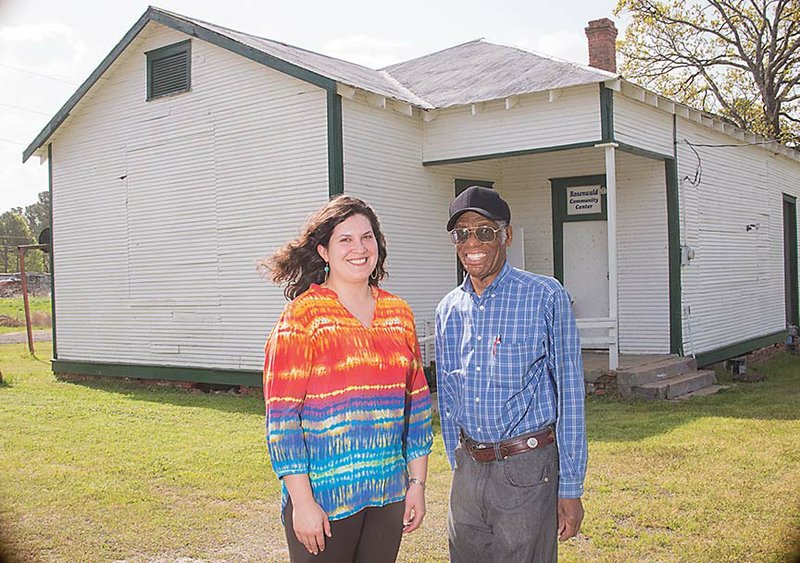Frequent travelers along Arkansas 60 between Conway and Bigelow may have noticed a small white building set off the road, adjacent to an empty lot that is still recognizable as a baseball field. Some may have wondered about the history of the building, which is in noticeable need of repair.
The building in question has a long history in Perry County. It is the Bigelow Rosenwald School, now known as the
Rosenwald Community Cultural Center. Plans are underway to restore this structure, which is listed on the National Register of Historic Places.
The two-classroom school, with a community room attached, was built in 1926 with funds made possible by the late Julius Rosenwald, president of Sears, Roebuck and Co. in 1908, and later, chairman of the board in 1922.
Not only was Rosenwald a successful businessman; he was a philanthropist. According to the website searsarchives.com, Rosenwald established the Julius Rosenwald Fund for the “well-being of mankind” in 1917. Through that fund, his charitable efforts led to the building of schools for African-Americans across the south, including Arkansas.
The National Trust for Historic Preservation recently awarded Preserve Arkansas a $2,500 grant from the Arkansas Preservation Services Fund. These grant funds, along with matching funds from the Rosenwald Community Cultural Center, have been used to hire a preservation architect to evaluate the current condition of the school, prioritize needs and provide cost estimates for rehabilitation of the structure.
Rachel Patton, executive director of Preserve Arkansas, said she recently talked with the preservation architect, Tommy Jameson of Jameson Architects in Little Rock. She said Jameson “is almost done” with the condition assessment.
“The overall conclusion is — the school can definitely be rehabilitated,” Patton said.
Patton said her organization would be available to help the cultural center’s board of directors look for additional grants and other funding as they proceed with plans to rehabilitate the school.
“This will give us a leg up,” said board member Melvin Williams. “We have been trying to do something with this building since 1973. I am from California, but my wife, the former Flora Gray, is from here and lived right across the road from the school.
“We moved back to the Toad Suck community in 1972, and I got involved with the effort to restore the building,” Williams said. “We use it now as a community center, but we want to refurbish it to how it used to be.”
Patton said the Bigelow Rosenwald School was one of 389 schools and associated buildings constructed in Arkansas with the help of the Rosenwald Fund. Only 18 of those buildings remain today.
“Preserve Arkansas included all Rosenwald schools in Arkansas on its 2005 Most Endangered Places list, which raises awareness of historically significant properties facing threats such as deterioration, neglect, insufficient resources and insensitive development,” Patton said. “In 2012, the Bigelow Rosenwald School was listed as a Most Endangered Place, making it a high priority for our organization.”
Williams said the school was closed in the 1960s when local schools were integrated
“They let the small children go to Bigelow and the older ones to Morrilton and some to Conway,” Williams said. “Bigelow [East End School District] took possession of the building in 1964 or ’65. We took possession of it in the 1980s and renamed it the Rosenwald Community Cultural Center
“With the help of [state] Sen. Jason Rapert (R-Conway), we are finally getting something done,” Williams said. “He turned the table for us. He represents us everywhere he goes. He has become an advocate for us.
“And with the help of Martha Hill, the wife of [U.S.] Rep. French Hill (R-Arkansas), we are now a 501(c)(3) nonprofit organization,” Williams said. “She is an attorney in Little Rock and did the paperwork pro bono for us.”
Williams said the Rosenwald Community Cultural Center continues to seek funds for the restoration project.
“For the past three years, we have held a Juneteenth celebration to raise money for this,” he said.
“This year’s celebration will be from 4-7 p.m. June 23. Everybody is welcome. We will have live music and sell hot dogs, hamburgers and drinks,” Williams said.
“After we receive the findings of the condition assessment, we will apply for grants to implement repairs to the building. The roof is the first thing we need to fix,” he said.
“We want to make this a historical site … a museum,” Williams said. “We hope to be able to build a new community center in back of the original building.
“We are also looking for someone to sponsor a historical marker for the school.”
Patton said the Department of Arkansas Heritage recently established the Arkansas Historical Marker Program and advised
Williams to contact that agency.
Patton said the goal of Preserve Arkansas is to return the Rosenwald School to its original condition.
“You can see where the original windows were,” she said, pointing to the sides of the building. “We want to reinstate those windows.
“Preserve Arkansas is committed to preservation education, advocacy and assistance. We are happy to help nonprofit organizations find grants like this one from the National Trust for Historic Preservation. We hope to be able to continue to help the Rosenwald Community Cultural Center find other grants to help restore the Rosenwald school. There are not many left in the state. Few are listed on the National Register. … This one is.”
